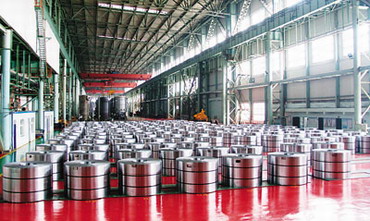 Home > News
Home > News



The chief executive of Emirates Steel has called on the UAE government to restrict imports from China and Turkey, warning that cheap foreign steel threatens to harm the country’s diversification efforts.
A strengthening dollar has made steel imports from China and Turkey cheaper, threatening the competitiveness of local producers.
“The steel industry plays a crucial role in the UAE’s industrial development plans and therefore should be protected against unfair trade practices,” said Saeed Ghumran Al Romaithi, the Emirates Steel CEO. Average steel prices have fallen by 7.1 per cent against the previous year as of February, according to the Statistics Center Abu Dhabi.
The average price of 10mm to 25mm steel reinforcement bars from Turkey has fallen by about 9.5 per cent over the same period, while 6mm to 8mm reinforcement bars have decreased in price by 19.1 per cent. That has been driven by the 26 per cent fall of the value of the Turkish lira against the dollar and dirham since last February.
Spot prices for Chinese steel have been steadily falling since 2011, and are now exactly 50 per cent lower than their peak in June of that year. That has been driven by reduced domestic demand for industrial metals, as growth in China halved from 14 per cent in 2007 to an expected 6.8 per cent in 2015.
Imports of steel billets increased by 300 per cent, while wire rod imports were up by 112 per cent, according to Emirates Steel.
While the market prices of UAE steel have fallen in tandem, this has eaten into domestic producers’ margins.
“If proper measures are not adopted, many producers in the UAE would be at risk of losing capacity, putting the country at risk of losing impetus in diversifying its economy away from dependence on oil as a major source of income,” said Mr Al Romaithi.
He has called for higher tariffs on Chinese and Turkish steel, anti-dumping regulations, and new regulatory standards to “fend off low-quality Chinese imports”.
The GCC abolished a 5 per cent duty on steel imports in October 2010. But raising tariffs could be a blow for developers.
Local contractors could be forced to raise prices if the UAE introduced new tariffs on structural steel, said Tersita Sanchez, an estimator at Al Jaber Contracting.
“If the material costs go up, we will increase our rates.” A tariff raise would “of course” be bad for business, she said.
On Sunday Egypt said it would impose an 8 per cent tariff on imported steel products, as the country’s producers struggle to cope with low global commodities prices.
The UAE has benefited from the absence of restrictions on its industrial metals exports. In October last year, the Indian authorities opted not to impose tariffs on the UAE’s aluminium exports, following lobbying from the Ministry of Economy.
XINSTEEL NEWS